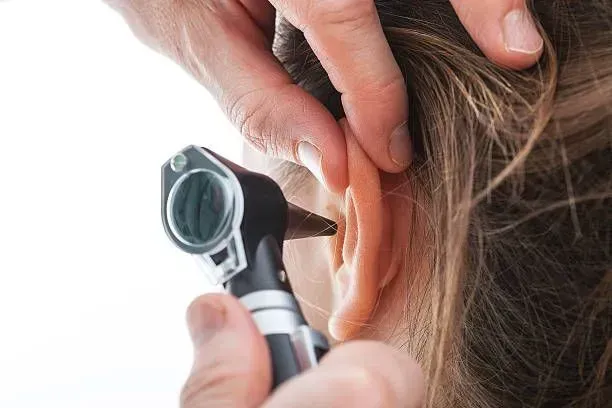Persistent Earaches and Sore Throat: Causes, Treatment and Prevention
Persistent earaches and a sore throat can disrupt daily life, making it difficult to eat, sleep, or focus on work. These symptoms may be caused by various underlying issues, some of which require medical attention.
In this blog, we'll explore the causes of these symptoms, discuss when to seek help, and offer practical tips for relief and treatment.
Understanding the Connection Between Earaches and Sore Throats
The ear, nose, and throat are closely connected, forming a network that makes these symptoms often occur together. The Eustachian tube, which links the middle ear to the upper throat, plays a significant role in this relationship. When one part of this system becomes inflamed or infected, it can affect the others, leading to simultaneous earaches and sore throats.
Common Causes of Persistent Earaches and Sore Throat

1. Infections
- Tonsillitis: Inflammation of the tonsils, often caused by viral or bacterial infections, can result in a severe sore throat and ear pain. Swollen tonsils, difficulty swallowing, and fever are common symptoms.
- Strep Throat: A bacterial infection caused by Streptococcus pyogenes that can radiate pain to the ears. Left untreated, it may lead to complications such as rheumatic fever.
- Otitis Media (Middle Ear Infection): Fluid buildup in the middle ear due to colds or respiratory infections can lead to ear pain and sometimes throat discomfort.
2. Sinus Infections (Sinusitis)
When
sinus cavities become inflamed, pressure builds up, often causing earaches and postnasal drip that irritates the throat.
3. Allergies
Allergic reactions to pollen, dust, or other allergens can trigger nasal congestion, leading to postnasal drip and Eustachian tube dysfunction, causing throat irritation and earaches.
4. Gastroesophageal Reflux Disease (GERD)
Acid reflux can irritate the throat lining, causing soreness. In some cases, the acid may reach the Eustachian tube, leading to discomfort in the ears.
5. Temporomandibular Joint (TMJ) Disorders
TMJ disorders affect the jaw joint and surrounding muscles, often causing referred pain to the ears and throat, particularly when chewing or speaking.
6. Dental Issues
Tooth abscesses or infections can cause referred pain to the ears and throat, emphasizing the importance of oral health.
7. Other Causes
- Environmental irritants like cigarette smoke or pollution.
- Dry air, particularly in winter, can dry out the throat and irritate the Eustachian tubes.
When to Seek Medical Attention
While many earaches and sore throats resolve on their own, certain symptoms require prompt medical evaluation:
- High Fever: A fever above 101°F could indicate a serious bacterial infection.
- Severe Pain: Intense or worsening pain in the ear or throat.
- Persistent Symptoms: Discomfort lasting more than a week without improvement.
- Swelling or Difficulty Breathing: Signs of airway obstruction.
- Hearing Loss or Ear Discharge: Possible indications of a ruptured eardrum or severe infection.
- One-Sided Symptoms: Pain isolated to one side may point to specific issues like a dental abscess or a peritonsillar abscess.
Related blog:
Conditions Treated in Urgent Care Clinics
Diagnosis
To determine the cause of persistent earaches and sore throats, healthcare providers may use the following methods:
- Physical Examination: A visual check of the throat, ears, and nasal passages to detect redness, swelling, or fluid buildup.
- Throat Swabs: To test for bacterial infections such as strep throat.
- Blood Tests: To identify viral infections like mononucleosis.
- Imaging: X-rays or CT scans to assess sinus infections or TMJ issues.
- Allergy Testing: To determine triggers for chronic symptoms.
Treatment Options
Persistent earaches and sore throats often require a tailored approach to treatment based on the underlying cause. From medications to surgical interventions, addressing the root issue is essential for lasting relief. Below, we outline various options to help alleviate these symptoms and improve overall well-being.

1. Medications
Medications play a crucial role in managing the pain and discomfort associated with earaches and sore throats. They not only alleviate symptoms but also target the infections or inflammation causing the issues.
- Antibiotics: These are prescribed for bacterial infections such as strep throat or severe sinusitis. Completing the full course ensures effective treatment.
- Antivirals: For specific viral infections, antiviral medications can help shorten the duration and severity of symptoms.
- Pain Relievers: Over-the-counter drugs like ibuprofen or acetaminophen can reduce inflammation and provide relief from pain.
- Decongestants and Antihistamines: These are especially useful in managing symptoms related to allergies or sinus issues by reducing congestion and easing pressure in the ears.
2. Home Remedies
For mild to moderate symptoms, home remedies can offer comfort and support the healing process. These remedies are particularly effective when paired with medications or as part of a preventive care routine.
- Warm Saltwater Gargles: Gargling with saltwater can reduce throat irritation, ease inflammation, and promote healing.
- Steam Inhalation: Inhaling steam helps to loosen mucus, clear sinuses, and alleviate nasal congestion, which can reduce related ear discomfort.
- Hydration: Staying well-hydrated keeps the throat moist, soothes irritation, and aids in flushing out toxins.
- Humidifier Use: Using a humidifier can add moisture to dry indoor air, easing throat and nasal irritation, especially in winter months.
3. Treating Underlying Causes
Addressing the underlying causes of persistent earaches and sore throats is key to preventing recurrence and achieving long-term relief. By targeting the root issue, you can minimize the chances of complications.
- GERD: Gastroesophageal reflux disease can often be managed with lifestyle adjustments, such as avoiding acidic foods and eating smaller meals, along with medications like antacids or proton pump inhibitors.
- TMJ Disorders: If jaw-related issues are causing earaches, treatments such as physical therapy, jaw exercises, or mouthguards can significantly alleviate symptoms.
4. Surgical Interventions
In cases where infections or anatomical issues are recurrent or severe, surgical options may provide lasting relief. These procedures are usually recommended when other treatments prove ineffective.
- Tonsillectomy: This procedure is often advised for patients with chronic tonsillitis or obstructive symptoms due to enlarged tonsils.
- Sinus Surgery: For individuals with severe or recurring sinus infections, surgery can help drain blockages and improve sinus function.
- Myringotomy: A minor procedure to drain fluid from the middle ear and relieve pressure, often performed for chronic ear infections.
Preventive Measures
Preventive measures are the cornerstone of avoiding persistent earaches and sore throats. By incorporating these practices into your daily life, you can protect your ear, nose, and throat health and reduce the frequency of symptoms.
1. Practice Good Hygiene
Hygiene plays a critical role in minimizing exposure to infections that can lead to earaches and sore throats.
- Wash your hands frequently to prevent the spread of germs.
- Avoid close contact with individuals who are sick to reduce the risk of viral or bacterial transmission.
2. Manage Allergies
Allergies can exacerbate symptoms by causing nasal congestion and throat irritation. Managing them effectively can improve overall comfort.
- Identify and avoid known triggers such as pollen, dust, or pet dander.
- Use prescribed allergy medications, such as antihistamines or nasal sprays, as directed by your doctor.
3. Maintain Oral Health
Oral health is closely connected to ear and throat health, making it essential to adopt good dental hygiene habits.
- Brush and floss your teeth regularly to prevent infections that may radiate pain to the throat or ears.
- Schedule routine dental checkups to catch and address dental issues early.
4. Strengthen Your Immune System
A robust immune system is your first line of defense against infections. Simple lifestyle changes can make a big difference.
- Eat a balanced diet rich in vitamins and minerals, particularly fruits and vegetables.
- Stay active with regular exercise, and ensure you get adequate sleep to keep your body resilient.
Related blog:
Healthy Eating Tips to Boost Your Nutrition
5. Protect Your Ears and Throat
Preventing exposure to irritants and maintaining optimal moisture levels in your environment can go a long way in avoiding these symptoms.
- Use earplugs in noisy environments to protect your hearing and avoid strain.
- Avoid smoking and exposure to secondhand smoke, which can irritate the throat and affect ear health.
- Stay hydrated to keep your throat moist and less susceptible to irritation.
Get the Care You Need Urgently
Persistent earaches and sore throats can disrupt your daily routine and may signal underlying health issues that require attention. Understanding their causes, recognizing when to seek medical help, and following appropriate treatment options are key to managing these symptoms effectively.
If your symptoms persist or worsen, don't hesitate to Check-in with us. We have healthcare professionals ready to help. Walk in at UgiClinic Urgent Care today!













